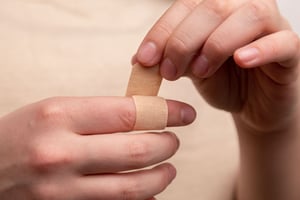
It’s Nothing Right? It Will Just Heal Up and Go Away
Everyone’s thought when they sustain a minor injury; from a “something got in my eye” to “it's just a little cut” our hope is always it will just get better and we don’t need medical care. Unfortunately, that is not typically the case, and what we write off as minor becomes major.
PARTNER SPOTLIGHT
Dealer Management System, Computer Technology, Media/Advertising, Automotive Auction, F & I/Aftermarket Products, Automotive Technology Training & Compliance
 A NHADA Gold PARTNER
A NHADA Gold PARTNERComputer Technology, Automotive Shop Equipment, Environmental Services
 A NHADA Platinum PARTNER
A NHADA Platinum PARTNERF & I/Aftermarket Products, Automotive Technology Training & Compliance, Environmental Services
.png?width=150&name=corp_logo_horz_on_light_with_trademark_symbol_1200w%20(002).png) A NHADA Diamond PARTNER
A NHADA Diamond PARTNERRecently the NHADA – WCT has seen an increase in “minor” eye injuries and lacerations. Often, we are receiving the Employers First Reports of Injury with “no medical treatment” checked off and based on the perception that it is not a big deal; no call is being made to us to check in before filing and making the decision the injury is a “no medical treatment claim”.
We have covered in previous articles the reason to give us a call when someone is hurt. Even if it’s a “no medical treatment” claim; we still want to hear from you. Of course, we always like to say hi but there is more to the call when the injury is perceived to be so minor. Here are some reasons why a call on a “no medical treatment” injury is so important:
- A minor laceration can easily be treated on-site at the employer with some good old soap and water and a nice smiley face Band-Aid; but….there are other factors to consider.
- What is the date of the injured worker's last Tetanus shot? If it’s been more than 5-8 years it's time for another one.
- What if sutures are needed? These need to be placed within 24 hours.
- What if there is a foreign body in that minor cut? If this goes unnoticed and the wound closes the injured worker is at risk for an infection caused by a retained foreign body. Providers will do an x-ray if a foreign body is suspected.
- What if the injured worker didn’t do a great job with that soap and water? Minor cuts can evolve into infections called cellulitis. When this happens antibiotics will need to be ordered and in some cases, cellulitis can progress to a blood infection that will need intravenous antibiotics to get better.
- What is the cost breakdown? Of course, onsite first aid is pretty cost-effective given that smiley-faced band-aids are cheap; but we would much rather cover the cost of an urgent care visit vs the cost of emergency room visits and intravenous antibiotics. Not to mention the latter comes with lost time from work. A visit to evaluate a wound that doesn’t require sutures may cost approximately $150.00 - $300.00 depending on if a Tetanus shot is required. Whereas emergency room visits for treatment of a wound infection will start at $1,000.00 and drastically rise from there as the visits may be required daily for 5-7 days.
- A minor foreign body in the eye can be easily treated on-site at the employer with some aggressive flushing at an eye wash station, but as with lacerations, there are other factors to consider.
- What was the foreign body? In most cases dust or debris can be easily flushed out of the eye; but in some cases, the foreign body might be rusty. In the case of rust, an ophthalmology appointment will be necessary to remove what is referred to as a “rust ring”. We are very lucky in NH to have many local ophthalmology offices that will see our injured workers on the same day. These visits can always start at urgent care but typically need to see a specialist.
- Did all of the foreign body get flushed out? Quite often the injured worker will think they got the foreign body out when in fact there is more. If a bigger piece was the cause of the discomfort, they may feel relief when it's removed; but if there are smaller particles, they may cause the discomfort to return and this often leads to emergency room visits as it occurs after hours of urgent cares and ophthalmologist’s offices.
- What if there is more to this than just the foreign body? Eyes are complex and let’s say in some cases they are not very forgiving of foreign bodies. In most cases yes, it’s a simple flush it and forget it; but all too often more damage has occurred. Foreign bodies can cause a multitude of serious eye injuries. These may include but aren’t limited to corneal abrasions, infections, globe ruptures, traumatic cataracts, retinal injuries, or even loss of an eye. With some of these eye injuries, surgery is needed and, in some cases, multiple surgeries. As you will likely guess; THESE ARE EXPENSIVE! The care will be specialized and often out of state and the injured worker will lose time from work.
- What is the cost breakdown? Eye wash stations are always accessible in this industry on site, if you do not have one please contact your loss prevention representative. As with minor cuts and scrapes though; we would much rather incur the cost of an urgent care visit or ophthalmology visit than face the bills from a Boston Hospital. Removal of a foreign body at an urgent care will run less than $300.00. The alternative if it's not a “no medical treatment” eye claim could reach medical costs exceeding $100,000.00 or more.
This meant to be an informative article soon turned scary; I apologize but the moral to the story is…please give us a call no matter how minor the injury is. Sometimes spending money on a visit no one thinks is necessary actually saves you money in the long run.
You can contact the NHADA-WCT team at 603-224-2369



















.png?width=150&name=Ally_Final%20Logos%20and%20Pairings_11.14.2018-01%20(2).png)


-2.png?width=150&name=Wipfli%20Logo%20Blue%20RGB%20(1)-2.png)


.jpg?width=150&name=NHADA_Partner_FTR_Img_NHADA_Insurance%20(1).jpg)


.jpg?width=150&name=NHADA_Partner_FTR_Img_JMA(1).jpg)

